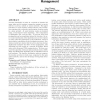Free Online Productivity Tools
i2Speak
i2Symbol
i2OCR
iTex2Img
iWeb2Print
iWeb2Shot
i2Type
iPdf2Split
iPdf2Merge
i2Bopomofo
i2Arabic
i2Style
i2Image
i2PDF
iLatex2Rtf
Sci2ools
132
click to vote
MOBIHOC
2006
ACM
2006
ACM
Robust distributed node localization with error management
Location knowledge of nodes in a network is essential for many tasks such as routing, cooperative sensing, or service delivery in ad hoc, mobile, or sensor networks. This paper introduces a novel iterative method ILS for node localization starting with a relatively small number of anchor nodes in a large network. At each iteration, nodes are localized using a least-squares based algorithm. The computation is lightweight, fast, and any-time. To prevent error from propagating and accumulating during the iteration, the error control mechanism of the algorithm uses an error registry to select nodes that participate in the localization, based on their relative contribution to the localization accuracy. Simulation results have shown that the active selection strategy significantly mitigates the effect of error propagation. The algorithm has been tested on a network of Berkeley Mica2 motes with ultrasound TOA ranging devices. We have compared the algorithm with more global methods such as MD...
Error Control Mechanism | Iterative Localization | Least-squares Based Algorithm | MOBIHOC 2006 | Wireless Networks |
Related Content
| Added | 24 Dec 2009 |
| Updated | 24 Dec 2009 |
| Type | Conference |
| Year | 2006 |
| Where | MOBIHOC |
| Authors | Juan Liu, Ying Zhang, Feng Zhao |
Comments (0)

